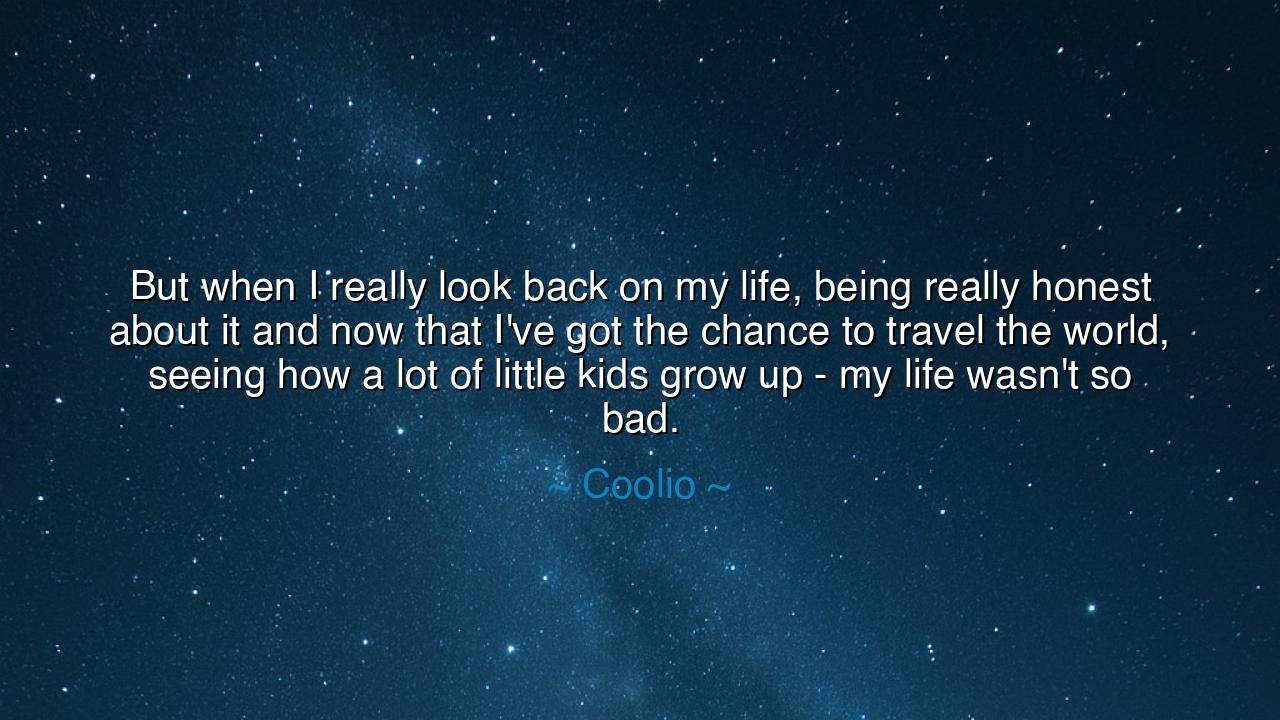
But when I really look back on my life, being really honest
But when I really look back on my life, being really honest about it and now that I've got the chance to travel the world, seeing how a lot of little kids grow up - my life wasn't so bad.






In the words of Coolio, a poet of the streets and a voice of his generation, we hear both humility and awakening: “But when I really look back on my life, being really honest about it and now that I’ve got the chance to travel the world, seeing how a lot of little kids grow up—my life wasn’t so bad.” At first these words seem casual, almost spoken in passing, but in them rests a wisdom carved out of hardship, growth, and perspective. They remind us that what once seemed unbearable may, in the light of the world’s broader suffering, become a source of gratitude.
To look back is an ancient act of reckoning. The hero who survives his trials does not simply march forward into glory, but pauses to reflect on the road already walked. Coolio’s reflection teaches us that honesty with oneself is a weapon stronger than pride, for it strips away bitterness and reveals truth. When we strip away the complaints of youth, the disappointments of the moment, we often discover that our journey, though difficult, gave us strength—and perhaps even mercy compared to the burdens borne by others.
The chance to travel the world gave him a gift older than gold: perspective. For when a man sees only his own corner of life, his sufferings feel absolute. But when his eyes behold the struggles of others—children growing up in poverty deeper than his own, or in circumstances harsher than he endured—then comes the awakening. He sees that his wounds, though real, are not the greatest wounds. His past, though rough, is not the worst past. This shift in vision turns resentment into gratitude, despair into strength.
History, too, bears witness to this transformation. Consider the journey of Nelson Mandela, who endured long years of imprisonment. He could have emerged only with bitterness, cursing the injustice he had suffered. Yet when he looked upon his people, when he saw the generations growing up under oppression, he chose a different perspective. His own pain, though heavy, was not unbearable compared to the suffering of millions. And so he transformed his story into one of hope, forgiveness, and a vision that healed a nation. Coolio’s words, though humbler, echo the same principle: personal suffering, seen through the lens of others’ struggles, becomes lighter to bear.
The mention of little kids is crucial. For it is in children that the purity of truth is revealed. To see a child growing up without shelter, without food, without even the chance to dream, is to be struck with the reality of what hardship truly means. Coolio, in beholding such lives, realized that his own story, once thought harsh, was not the darkest fate. His awakening is a reminder to all: we measure our lives not only by what we have lost, but by the blessings we did not realize we held.
The lesson is clear: gratitude is born of perspective. To dwell only on our hardships is to chain ourselves to sorrow. But to lift our eyes, to see the burdens of others, is to find strength in our own story and to give thanks for the mercies hidden in it. Reflection does not erase pain, but it transforms it into wisdom, allowing us to carry it not as a weight, but as a teacher.
So I say to you, children of the future: when you look back upon your life, do so with honesty. Compare not with envy, but with humility. Let your travel, whether across the world or into the stories of others, teach you gratitude. And when you see those whose lives are harsher, let it not harden your heart but open it, so that you may give, uplift, and honor the blessings you have received. For in truth, as Coolio found, even the hardest life may yet reveal itself as “not so bad.”






AAdministratorAdministrator
Welcome, honored guests. Please leave a comment, we will respond soon